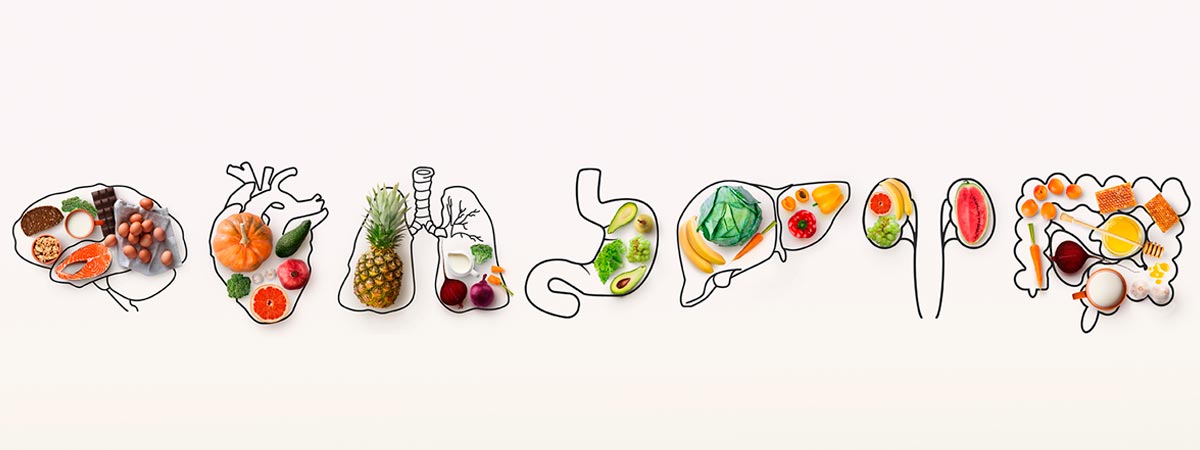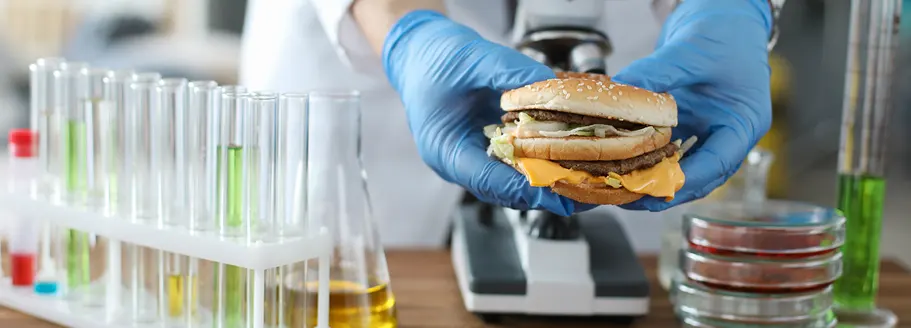Bachelor’s Degree in Human Nutrition and Dietetics

Modern nutrition stands as an advanced and rigorously evidence-based discipline
Breakthroughs in molecular biology and food science have transformed the field, reshaping health policy and food security measures. Aligned with the Sustainable Development Goals of the 2030 Agenda, these advancements underscore the significance of promoting healthy diets, ensuring food security, and fostering sustainable agriculture. Modern nutrition emphasizes health promotion and disease prevention, contributing to the objectives of "Zero Hunger," "Health and Well-being," and "Responsible Production and Consumption." These efforts carry profound global socioeconomic implications in response to the escalating demand for food and nutritional resources.
The Bachelor's program in Human Nutrition and Dietetics has been meticulously crafted to offer comprehensive training encompassing all facets of nutrition and dietetics, blending scientific knowledge with professional practice. It aligns with the health-oriented vision of the School of Life Sciences, embracing the ONE HEALTH concept advocated by entities such as the World Health Organization.
The primary goal is to cultivate skilled and proficient professionals capable of addressing human nutrition challenges innovatively. These individuals will play a pivotal role in promoting health and disease prevention through dietary interventions. They will grasp the significance of broader issues such as zoonotic disease control and combating antibiotic resistance within the food industry context.
Why study the Grado en Nutrición Humana y Dietética

Health and well-being education
This program contributes to enhancing the health, well-being, and quality of life of individuals, families, and communities. It takes into account various factors including ethical, deontological, political, social, economic, environmental, and biological aspects.

Curriculum grounded in critical analysis
Execute nutritional interventions across the lifespan for individuals with pathologies, serving as a supplemental aspect to therapeutic treatments, rehabilitation, and health recovery, implementing diet therapy founded on critical analysis and robust scientific knowledge.

Management strategies
Formulate quality management strategies for the food industry, integrating them from the inception, preparation, production, to the marketing of food. These strategies are innovatively designed, compliant with current regulations, and foster teamwork, ethical conduct, and social responsibility.

Scientific method
Apply the scientific method to conduct foundational research on nutritional challenges in food, and devise intervention and assessment strategies. These approaches are cultivated through teamwork and continuous learning, fostering self-directed inquiry and critical, responsible, and ethical analysis.
Curriculum
All our degrees and curricula have been developed in accordance with the new guidelines set by current legislation, having already been verified by the National Quality Assessment Agency.
The student must take 240 credits
First year 60 ECTS
Yearly 12 ECTS- 6 ECTS | Human anatomy and physiology
First Semester 24 ECTS- 6 ECTS | Cell and Tissue Biology
- 6 ECTS | Applied Chemistry
- 6 ECTS | Structural Biochemistry
- 6 ECTS | Statistics
Second Semester 24 ECTS- 6 ECTS | Nutrition Psychology
- 6 ECTS | Fundamentals of Nutrition
- 6 ECTS | Metabolic Biochemistry
- 6 ECTS | Health Anthropology
Second year 60 ECTS
First Semester 30 ECTS- 6 ECTS | Bromatology I
- 6 ECTS | Culinary Technology
- 6 ECTS | Microbiology and Parasitology
- 6 ECTS | Food Toxicology
- 6 ECTS | Economics and Management of the Food Business
Second Semester 30 ECTS- 6 ECTS | Bromatology II
- 6 ECTS | General Pathophysiology
- 6 ECTS | Nutrition in the Stages of Life
- 6 ECTS | Endocrinology and Nutrition
- 6 ECTS | Research Methodology
Third year 60 ECTS
First Semester 30 ECTS- 6 ECTS | Dietetics
- 6 ECTS | Public Health
- 6 ECTS | Hygiene and Food Safety
- 6 ECTS | Pharmacology Applied to Nutrition
- 6 ECTS | Nutrition in Physical Activity and Sport
Second Semester 30 ECTS- 6 ECTS | Intestinal Microbiota and Probiotics in Human Nutrition
- 6 ECTS | Diet Therapy and Clinical Nutrition I
- 6 ECTS | Nutritional Epidemiology
- 6 ECTS | Quality Management
- 6 ECTS | Immunonutrition and Nutritional Genomics
Fourth year 60 ECTS
First Semester 30 ECTS- 6 ECTS | Food Legislation and Ethics
- 6 ECTS | Diet Therapy and Clinical Nutrition II
- 6 ECTS | AFood in Communities
- 6 ECTS | Elective I
- 6 ECTS | Elective II
Second Semester 30 ECTS- 18 ECTS | Professional Internship
- 12 ECTS | Final Research Project
More info about the subjects
- 6 ECTS | Molecular Bases of Personalized Nutrition
- 6 ECTS | Food and Aging
- 6 ECTS | Cancer and Food
The recognition of 6 credits will be assessed depending on the different activities that the student performs throughout his degree. They will be awarded for university cultural activities, sports, student representation, solidarity and cooperation, or for taking one of the following subjects: Ethics of volunteering or Human Rights.
Program which aims to promote the practical training of students, under the continuous supervision of the Department of Professional Careers of the University, the academic department corresponding to the degree and the company or collaborating institution where the practices are carried out. Advice is provided on the internship and there is follow-up and tutoring, always taking into account the professional orientation of each student.
We have agreements in internship centers in Spain.
More Information about Internships in CompaniesThe End of Degree Project is an academic report that delves into a subject of the curriculum and allows the evaluation of the skills acquired in the Degree. It can be linked to the professional internship or it can also be part of a research project.
Nebrija University, which is committed to languages and quality, provides the student with added value with the Diploma in English Professional Communication, which will allow him/her to achieve with confidence the competence demanded to successfully join the labor market.
It corresponds to level C1.
More information hereMore Academic Information
Official Degree: Bachelor’s Degree in Human Nutrition and Dietetics
Prospective students interested in pursuing a Bachelor's degree in Human Nutrition and Dietetics from UNNE should possess a genuine passion for the nutritional dietitian profession, a strong sense of service, and a genuine interest in public health. We seek individuals with a collaborative mindset, excellent work ethic, and a keen analytical ability. Candidates should demonstrate proficiency in teamwork and exhibit a commitment to resource management, coupled with a strong sense of responsibility and scientific curiosity.
240 credits.
Minimum of 12 ECTS credits and maximum of 90 ECTS credits per enrollment and academic period.
Center responsible:School of Life and Nature Sciences
Branch of knowledge: Health Sciences
Openings available: 45
Tipo de Enseñanza: Classroom attendance
Academic year in which it was implemented: 2024-2025
Languages: Spanish
University Services: [+info]
Competences
General objectivesThe Bachelor's Degree in Human Nutrition and Dietetics offered by the Antonio de Nebrija University was established to meet the requirements outlined in Order CIN/730/2009, dated March 18, which sets forth the standards for the accreditation of official university degrees enabling individuals to practice as Dietitian-Nutritionists. In accordance with this Order, the overarching objectives that students enrolled in the Bachelor's Degree in Human Nutrition and Dietetics program must achieve are outlined in the following sections:
- Cultivate the professional values, attitudes, and ethical behaviors inherent to the role of a Dietitian-Nutritionist.
- Enhance proficiency in communication and information management within the realm of Human Nutrition and Dietetics.
- Acquire comprehensive knowledge and practical skills in the field of food sciences.
- Gain expertise in the principles and application of Nutrition and Health Sciences.
- Understand the foundational concepts of Public Health and Community Nutrition.
- Develop proficiency in management and provide legal and scientific guidance in Human Nutrition and Dietetics.
- Attain the ability to implement quality management practices in food services, both general and specifically in collective catering.
- Foster critical thinking skills and research aptitude in the context of Human Nutrition and Dietetics.
At the culmination of this degree, in alignment with Order CIN/730/2009, of March 18, which sets forth the requirements for official university degrees enabling the practice of the Dietitian-Nutritionist profession, students will have acquired the following knowledge:
- Understanding of the chemical, biochemical, and biological principles applicable to human nutrition and dietetics.
- Familiarity with the structure and function of the human body, spanning from the molecular level to the entire organism across various life stages.
- Proficiency in statistics as applied to Health Sciences.
- Understanding of the psychological fundamentals and bio-psycho-social factors influencing human behavior.
- Insight into the historical, anthropological, and sociological evolution of food, nutrition, and dietetics within the context of health and illness.
- Familiarity with various educational methodologies applicable in health sciences, alongside communication techniques pertinent to food and human nutrition.
- Comprehensive understanding of the fundamentals and foundations of food and human nutrition.
- Knowledge of the morphology, structure, and function of bodily systems, including the skin, blood, circulatory, digestive, locomotor, reproductive, excretory, respiratory, endocrine, immune, central nervous, and peripheral nervous systems.
- Familiarity with the Spanish healthcare system and basic aspects related to health services management, particularly those concerning nutritional aspects.
- Understanding of the chemical composition, physical-chemical properties, nutritional value, bioavailability, organoleptic characteristics, and modifications undergone by foods due to technological and culinary processes.
- Knowledge of food production systems and basic processes involved in the preparation, transformation, and preservation of major food items.
- Proficiency in the fundamentals of bromatological and sensory analysis of food products.
- Understanding of food microbiology, parasitology, and toxicology.
- Proficiency in culinary techniques aimed at optimizing the organoleptic and nutritional attributes of foods, with due regard to traditional gastronomy.
- Awareness of aspects concerning the economy and management of food businesses.
- Knowledge of nutrients, their functions, metabolic utilization, and the principles of nutritional balance and regulation.
- Understanding of pathophysiological aspects of nutrition-related diseases.
- Insight into hospital organization and the various phases of food service.
- Familiarity with different basic and advanced nutritional support techniques and products.
- Understanding of clinical pharmacology and drug-nutrient interactions.
- Awareness of the legal and ethical boundaries governing dietary practice.
- Knowledge of national and international health organizations and systems, as well as health policies, acknowledging the role of the Dietitian-Nutritionist.
- Understanding of human microbiota generalities and the distinct microbial communities within the gastrointestinal tract.
- Insight into the relationship between dysbiosis of the intestinal microbiota and the pathophysiological mechanisms underlying digestive, skin, urogenital, neurological, and other organ and system diseases.
- Proficiency in mechanisms and pathways of microbiota modulation, particularly through diet and the utilization of biotics.
- Knowledge of fundamental principles of molecular nutrition and gene expression regulation.
- Insight into the molecular bases of major non-communicable diseases and relevant biomarkers.
- Awareness of primary personalized nutrition tools, grounded in clinical biochemistry and omics sciences.
- Understanding of the biopsychosocial conditions of aging and their implications for nutritional status and requirements.
- Insight into the molecular determinants of healthy aging and their association with personalized nutrition.
- Awareness of the influence of diet on cancer initiation and progression.
- Understanding of the fundamentals for planning dietary-nutritional education programs for patients undergoing anti-tumor treatment.
- Knowledge of health institution organization and dietitian-nutritionist consultation, along with the roles of dietitian-nutritionists and other healthcare professionals.
- Understanding of evidence-based practice principles, academic work structure, and public defense of scientific reports.
At the culmination of this Bachelor's degree, and in accordance with Order CIN/730/2009, dated March 18, which sets forth the requirements for official university degrees qualifying for the practice of the Dietitian-Nutritionist profession, students will have honed the following skills:
- Comprehend and articulate the morphology, structure, and function of the human body across varying health statuses and within natural and social contexts.
- Recognize anatomical structures to establish dynamic relationships with functional organization.
- Describe the anthropological underpinnings of human nutrition and analyze cultural and social disparities influencing dietary habits.
- Classify and categorize foods, food products, and ingredients.
- Utilize, interpret, and manage nutritional databases and food composition tables effectively.
- Contribute to the design, organization, and management of diverse food services.
- Contribute to the implementation of quality assurance systems.
- Evaluate, monitor, and manage traceability aspects.
- Contribute to business teams for social marketing, advertising, and promoting healthy claims.
- Collaborate in consumer protection efforts within the realm of food safety.
- Design, control, and participate in the planning of menus and diets tailored to specific group characteristics.
- Intervene in product, facility, and process quality and food safety.
- Provide appropriate hygienic-sanitary and dietary-nutritional training to restaurant service staff.
- Interpret reports and administrative documents pertaining to food products and ingredients.
- Assess and calculate nutritional requirements across various health and disease contexts throughout the life cycle.
- Identify the fundamentals of a healthy diet and participate in the design of comprehensive diet studies.
- Detect, evaluate, and manage deviations from nutritional balance, whether quantitative or qualitative.
- Plan, conduct, and interpret nutritional status assessments for individuals and groups, including healthy and diseased populations.
- Identify dietary-nutritional issues, risk factors, and improper practices in patients.
- Compile and interpret dietary histories for both healthy and diseased individuals, as well as medical histories, utilizing health science terminology.
- Interpret and integrate clinical, biochemical, and pharmacological data into nutritional assessments and treatment plans.
- Apply clinical nutrition principles to diet therapy effectively.
- Devise, implement, and assess therapeutic diets for individuals and groups.
- Contribute to multidisciplinary teams in Hospital Nutrition Units.
- Develop and implement dietary-nutritional transition plans.
- Plan and execute dietary-nutritional education programs for healthy and diseased individuals.
- Navigate basic ICT tools pertinent to Food, Nutrition, and Dietetics.
- Prescribe specific treatments within the dietitian-nutritionist's scope of practice.
- Participate in the analysis, planning, implementation, and evaluation of epidemiological studies and intervention programs in food and nutrition.
- Design and conduct nutritional assessments to identify population food and nutrition needs and determinants of nutritional health.
- Develop and implement dietary-nutritional education and training programs in nutrition and dietetics.
- Prepare reports and maintain records related to the professional intervention of the Dietitian-nutritionist.
As Human Nutrition and Dietetics is a regulated profession in Spain, the competences listed below align with Order CIN/730/2009, dated March 18, which establishes the requirements for the verification of university degrees qualifying individuals to practice as Dietitian-nutritionists.
Furthermore, the acquisition of competences is ensured in accordance with the Spanish Qualifications Framework for Higher Education (MECES) and Royal Decree 822/2021.
- Develop teamwork skills within a multidisciplinary context involving professionals and other personnel involved in diagnostic evaluation and treatment in the field of dietetics and nutrition.
- Apply, evaluate, and maintain hygiene and food safety practices, as well as risk control systems, in compliance with current legislation.
- Provide scientific and technical advice on food products and their development, ensuring adherence to professional recommendations, and evaluate compliance to that advice.
- Develop the proficiency to underpin the dietitian-nutritionist's interventions with scientific principles, ensuring that professional practices are grounded in scientific evidence.
- Offer guidance on the development, commercialization, labeling, communication, and marketing of food products in alignment with societal needs, scientific knowledge, and regulatory requirements.
- Apply principles of Food and Nutrition Sciences to dietary practice.
- Evaluate the relationship between food, nutrition, and health in both healthy and pathological conditions.
- Utilize scientific knowledge of physiology, pathophysiology, nutrition, and feeding to formulate dietary plans and recommendations for individuals and communities across the lifespan.
- Design and implement protocols for assessing nutritional status, identifying risk factors, and implementing appropriate interventions.
- Contribute to the organization, management, and delivery of hospital feeding modalities, nutritional support, and outpatient dietary treatments.
- Collaborate in the development of food and nutrition policies aimed at promoting health and nutritional education within communities.
- Participate in community and public health-focused promotion, prevention, and protection projects.
- Uphold ethical principles, legal responsibilities, and professional standards in dietitian-nutritionist practice, while respecting individuals' habits, beliefs, and cultures.
- Foster teamwork and mutual respect among healthcare professionals.
- Recognize the importance of continuous professional development and staying updated on advancements in nutrition and food-related knowledge, products, and techniques.
- Identify the boundaries and limitations of the profession, knowing when interdisciplinary collaboration or referral to other professionals is necessary.
- Communicate effectively with diverse audiences, utilizing both oral and written communication skills, and leveraging information and communication technologies relevant to nutrition and lifestyle.
- Critically evaluate and apply information sources related to nutrition, food, lifestyles, and health.
- Develop foundational skills for research activity, including hypothesis formulation, data collection, interpretation, and problem-solving following the scientific method.
- Apply specialized knowledge acquired during the degree program to professional practice as a Dietitian-nutritionist, adhering to democratic principles, values, and the Sustainable Development Goals.
- Act ethically and responsibly in addressing social, environmental, and economic challenges, with a commitment to promoting sustainable practices.
- Assess the ethical implications of decisions within specific contexts, considering societal impact and professional accountability.
- Demonstrate awareness of sustainability and climate change considerations in professional practice.
- Uphold principles of diversity, universal accessibility, and inclusive design.
- Contribute to the development of solutions that address societal needs while aligning with the Sustainable Development Goals.
For pre-admission and admission purposes, candidates will be evaluated on a scale of 0 to 10 points, considering the following criteria and their respective percentages:
- Academic record [60%]
Evaluation of the candidate's academic achievements in their previous studies. - Structured personal interview [30%]
Assessment of the candidate's suitability based on their experience, knowledge, technical and professional skills relevant to the intended studies. Additionally, their motivation, attitudes, and other personal aspects contributing to their adjustment to the chosen studies will be evaluated. The interview may be conducted in the language of instruction. - Candidate presentation document [10%]
The candidate will prepare a personal document explaining their motivation and interest in the desired studies, along with any other relevant personal circumstances for the selection process.
If the candidate's mother tongue is not Spanish, they must provide proof of a B2 level of proficiency in Spanish through an accredited certificate.
Employability
Career Opportunities
The profession of Dietitian-Nutritionist empowers these health professionals to practice their regulated profession across various sectors, including both public and private domains or independently:
Partnerships
Employability recognized in the Rankings
The commitment of Nebrija University to the academic requirement, training in leading companies and institutions, innovation in multidisciplinary programs and international projection, places the University in the top positions of the most important rankings.
The International Ranking QS Stars awards Nebrija University the maximum score in the quality and satisfaction of students in teaching, employability of the graduates and the internationalization of the institution.
The national rankings also recognize Nebrija University as the first Spanish university in teaching and second in employability, highlighting its performance in research, knowledge transfer and internationalization.
The Bologna Declaration formalized the principles on which the European Higher Education Area should be based: quality, mobility, diversity, competitiveness and employment growth.
From this, Nebrija stands as an academic model of reference, educating students with excellent individual behavior, interaction with their environment and motivated by and for constant and continuous training. The Nebrija Institute of Professional Skills works every day to achieve the differentiation of our students through the development of attitudes and skills.
The main objective is for students to achieve the best of themselves through the development and empowerment of their personal skills and resources through personal self-knowledge.
In addition, some of the professional skills that are worked on within the three seminars are those related to interpersonal skills and active communication skills and negotiation, indispensable for our students to know how to transmit ideas, to argue them, to provide information and opinions in an adequate, clear and convincing way.
Within what will be their work performance, other aspects such as teamwork, conflict resolution and project management ability will be worked on.
In the third block, skills worked on are those aimed at increasing the student's employability. They will work with tools and techniques for job searching, and perform tasks that achieve in the student a greater use of their personal skills.
For all this we have currently active experts in selection of people, professionals dedicated to personal and professional training and professionals dedicated to the world of communication and the arts.
In this way, and in a complementary way to his/her specific training, we help the student create a differentiating pattern in the social and business environment in which he/she will be immersed when he/she finishes his/her studies.
International
The Department of International Programs at Nebrija University consistently monitors agreements with renowned universities worldwide.
Your Bachelor’s Degree in Human Nutrition and Dietetics
Visit all the Activities of the School of Life and Nature Sciences
Opening Ceremony of the Academic Year 2022-2023
Opening Ceremony of the Academic Year at the Madrid – Princesa Campus of Nebrija University.
Act of Saint Thomas Aquinas
Event in commemoration of the Feast Day of Saint Thomas Aquinas, with the master class entitled The cultural mission of the university and the Law, by Manuel Atienza, professor of Philosophy of Law at the University of Alicante
IMPULSA I. Nebrija Employment Event
This event facilitates connections between Nebrija talent and companies, organized by Nebrija Alumni and the Professional Careers department.
XXVII Rector's Trophy for Cross-country
XXVII Rector's Cross-country event at the Life Sciences Campus in La Berzosa.
